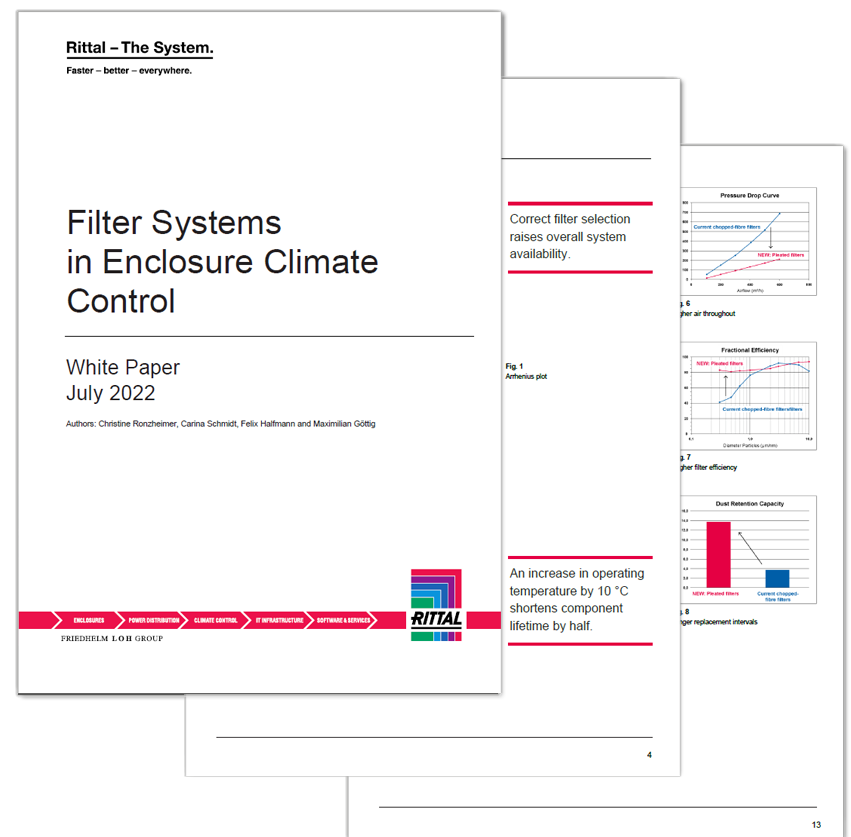By Rittal on Jul 26, 2024 6:41:45 AM
Selecting the correct filters for cooling units or fan-and-filter units is crucial for maintaining the efficiency and longevity of enclosure climate control systems. In the diverse climates of Australia and New Zealand, making informed filter choices can significantly impact system performance, reliability, and cost-effectiveness.
Why Filter Selection Matters
System Performance and Efficiency
Proper filter selection ensures that enclosure climate control systems operate efficiently. Inadequately filtered air can introduce contaminants that degrade system components, reducing cooling performance and increasing energy consumption. In environments with high ambient dust or industrial pollutants, such as many parts of Australia and New Zealand, this can be particularly problematic.
Component Longevity
Filters play a critical role in protecting sensitive electronic components within enclosures. The Arrhenius plot indicates that a 10°C increase in component temperature can halve its lifespan, underscoring the importance of effective climate control. Proper filter selection helps maintain optimal temperatures, extending component life and reducing the risk of system failures.
Cost Savings
While cheaper, non-original filters might seem cost-effective, they often result in higher long-term costs. Original filters are designed to meet specific performance standards, ensuring adequate air throughput and minimal pressure drop. This translates to lower energy consumption, reduced maintenance frequency, and fewer unplanned downtimes.
Types of Filters and Their Applications
Fan-and-Filter Units
For applications where ambient air is directly drawn into the enclosure, such as with roof-mounted fans or fan-and-filter units, effective filtration is essential. These filters need to protect the enclosure from various contaminants present in the environment. For example, in coastal areas of Australia, where salt and moisture can be issues, filters that prevent corrosion are vital.
Cooling Units, Heat Exchangers, and Chillers
In these systems, filters primarily protect the climate control system itself. Since there is no direct exchange between ambient air and the enclosure interior, filters need to prevent large dust particles and debris from clogging the system. In industrial zones of New Zealand, where air quality might include industrial particulates, robust filtering solutions are necessary.
Key Considerations for Filter Selection
Environmental Conditions
Assess the degree of contamination in your environment. Coastal areas may require filters that handle salt and moisture, while arid regions need filters that deal with fine dust particles. Understanding your local conditions helps in selecting the appropriate filter type, whether it’s a pleated filter for fine dust or a metal filter for oil-laden atmospheres.
Filter Maintenance
Regular maintenance is crucial for sustained performance. Pleated filters, for example, offer higher efficiency and longer replacement intervals compared to chopped-fibre filters. They are particularly beneficial in dusty environments, reducing the frequency of maintenance and overall costs.
Compliance with Standards
Ensure that your filters comply with the latest standards, such as DIN EN ISO 16890. This standard provides a more practical and precise classification for filters, focusing on their ability to retain different particle sizes, ensuring you choose the most effective filter for your specific application.
To explore how appropriate filter selection and maintenance can enhance your enclosure climate control systems’ efficiency, reliability, and cost-effectiveness, download our comprehensive white paper.


